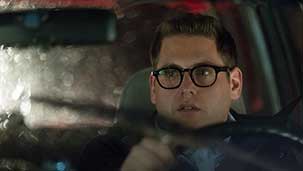I have never believed you. On a deep, molecular level I find you utterly unconvincing. No matter what character you may be playing I find it almost impossible to accept you as anything other than Jonah Hill pretending to be some guy. So the fact that you are the deeply flawed protagonist of a film called True Story is kind of problematic.
The Jonah Hill Effect is far less of a barrier for me in movies like 21 Jump Street or This is The End because you are not playing a character that requires much of a stretch—either on my part or yours. All I have to do is accept the premise of you as helpless schlub (and, in the case of This is The End, demon spawn) and I’m in. In True Story though, your singular capacity to undermine my suspension of disbelief is reflective of the films most glaring weakness.
True Story is an account of the relationship between a journalist and an accused murderer. It is the kind of true crime story (like NPR’s Serial or HBO’s The Jinx: The Life and Deaths of Robert Durst) that demonstrates a reality that ethicist Janet Malcolm delineates in her book, The Journalist and the Murderer: "Every journalist who is not too stupid or too full of himself to notice what is going on knows that what he does is morally indefensible." It is the kind of work that—if it is to be successful at all, and not simply exploitative and inherently parasitic—requires the finest sort of calibrations regarding tone and presentation.
True Story feels most thin when dealing with its central theme—what is the space between people’s stated intentions and their actions—largely because the two central characters are not presented credibly. I don’t believe James Franco’s portrayal as accused murderer Christian Longo and I certainly do not believe you in the role of disgraced NYT journalist Michael Finkel.
Your performance is arid, disengaged. Your scenes with Franco feel like a table read or a workshop, completely devoid of emotional content. The performance is so mechanical and workmanlike that I feel like I am watching particularly well rehearsed community theatre, competent enough but devoid of any real emotional truth.
True Story’s problems do not begin and end with casting. The choice to break the film into vignettes that are so clearly delineated make the whole exercise feel dispassionate and removed. The point of making a fictional film based on true events would seem to be about reaching some deeper truths, something that lies behind a straightforward recitation of events. But the film’s structure undermines that goal, leaving it feeling emotionally sterile and disconnected from its subject matter.
True Story certainly strives for a kind of authenticity—using natural light and low-key performances, long takes and a general reserve in the story telling. The pallet is cold and often muted and nothing about the visual presentation is over the top. Normally these would all be points in the film’s favor but in this case they tend to underline the vacuity of the central performances.
You are the only way into this film for the audience but you are an unreadable cipher. The character you portray is the linchpin of the whole story and you just don’t give us enough to hang onto—despite the fact that, as a narrator, your character is inherently unreliable. I don’t even believe the truth of your lies, as it were. So at the end of the film all I could think was how interesting this story might have been if it had been a documentary.
Sincerely,

Tim







